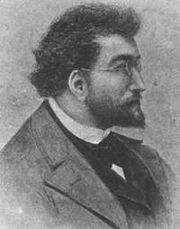
Ladislav Stroupežnický
Encyclopedia

Ladislav Stroupežnický was a renowned Czech
Czech people
Czechs, or Czech people are a western Slavic people of Central Europe, living predominantly in the Czech Republic. Small populations of Czechs also live in Slovakia, Austria, the United States, the United Kingdom, Chile, Argentina, Canada, Germany, Russia and other countries...
author, playwright, and dramatist, best known for the frequently staged play Naši furianti
Naši furianti
Naši furianti is a Czech play based on story by Ladislav Stroupežnický, played for the first time in 1887. In 1937 a film adaptation with the same title, directed by Vladislav Vančura was made.- Story :...
.
Life
He was born at CerhoniceCerhonice
Cerhonice is a village and municipality in Písek District in the South Bohemian Region of the Czech Republic.The municipality covers an area of , and has a population of 131 ....
and attended high school at Písek
Písek
Písek is a town in the South Bohemian Region of the Czech Republic. It has a population of 29 909 .-About:Písek is usually called "The Athens of the South", although Athens is much more southerly, because it has many high schools and schools of higher education, e.g. the Film School in Písek...
, but was expelled and had to return to work on the family farm. Early in 1867, he was involved in a mysterious incident which resulted in the suicide of a childhood friend named Jan Alšovými. On 11 August 1867 Stroupežnický mistakenly fired his gun at the gamekeeper's son, who mimed death; thinking he had killed another acquaintance, he shot himself in the face, but survived, losing his nose and lower jaw. They were later replaced with elaborate prostheses.
After a long period of recovery he moved to Prague
Prague
Prague is the capital and largest city of the Czech Republic. Situated in the north-west of the country on the Vltava river, the city is home to about 1.3 million people, while its metropolitan area is estimated to have a population of over 2.3 million...
and worked for the city council and then for an insurance company, meanwhile writing pieces for humour magazines.
In 1882 he started writing for the newly opened National Theatre
National Theatre (Prague)
The National Theatre in Prague is known as the Alma Mater of Czech opera, and as the national monument of Czech history and art.The National Theatre belongs to the most important Czech cultural institutions, with a rich artistic tradition which was created and maintained by the most distinguished...
. His first plays were not successful but his reputation slowly grew. His lack of literary education prevented him from becoming director, but he ably handled administrative matters and helped the theatre become financially successful. He married in 1890, but fell seriously ill soon afterwards, possibly as a result of overwork and the hostility of co-workers. He died in 1892, on the 25th anniversary of his suicide attempt, and was buried in Olšany Cemetery
Olšany Cemetery
Olšany Cemetery is the largest graveyard in Prague, Czech Republic, once having as many as two million burials. The cemetery is particularly noted for its many remarkable art nouveau monuments.- History :...
.
Plays
- Noviny a karty ("Papers and Cards", 1875)
- Pan Měsíček, obchodník ("Mr Moonchick, Businessman", 1877)
- Černé duše ("Black Soul", 1877)
- V ochraně Napoleona ("Napoleon's Defence", 1878)
- Zvíkovský rarášek ("Zvíkov's Imp", 1883)
- Triumfy vědy ("Triumphs of Science", 1884)
- Velký sen ("Big Dream", 1884)
- Paní mincmistrová ("Mistress of the Mint", 1885)
- Christoforo Colombo ("Christopher Columbus", 1886)
- Naši furianti ("Our Young Bucks", 1887)
- V panském čeledníku ("The Servants' Quarters", 1887)
- Sirotčí peníze ("Orphans' Money", 1887)
- Václav Hrobnický z Hrobnic (1888)
- Vojtěch Žák, výtečník ("Student Vojtěch, the Paragon", 1890)
- Zkažená krev ("Tainted Blood", 1891)
- Na Valdštejnské šachtě ("Waldstein Shaft", 1892)
Prose works
- Humoristické čtení ("Humorous reads", 1875)
- Cavani (1878)
- Rozmarné historky ("Funny stories", 1879)
- Povídky a novely ("Stories and Tales", 1881)
- Synové grafitového rytíře ("Sons of the Graphitic Knights", 1881)
- Z Prahy a venkova ("Prague and the Country", 1891)

